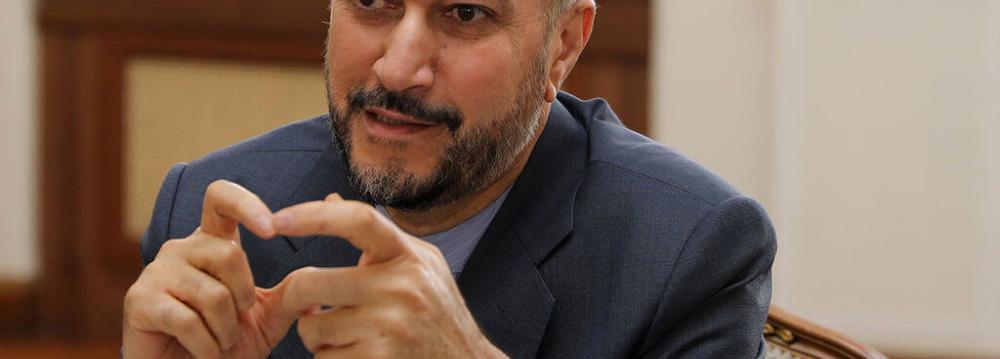The remaining areas of conflict in talks to revive the 2015 nuclear deal can be resolved to reach a final agreement if western parties adopt a realistic approach, Iran’s top diplomat said.
Hossein Amir-Abdollahian said Iran is ready for a “good agreement”, stressing the need for the other sides to make their political decisions.
“Iran is after a good agreement, but within the framework of its national interests and in accordance with its red lines,” he said in a phone conversation with the European Union coordinator of the nuclear deal, Josep Borrell, on Saturday, ISNA reported.
The deal, also known as the Joint Comprehensive Plan of Action, was struck between Iran and the six world powers to curb Tehran’s nuclear activities in return for the lifting of international sanctions.
The United States, however, pulled out in 2018 and reimposed tough sanctions that jeopardized Iran’s promised interests. In response, Tehran eventually scaled down its commitments a year later.
Indirect negotiations in the Austrian capital Vienna started in April to work out how both sides could resume compliance.
Borrell said the talks have reached a critical point and require serious decisions by all sides.
Tehran wants an effective and verifiable removal of all sanctions before reversing its nuclear steps. It also demands assurances that no future US government would violate the deal again.
“Iran’s definite choice is not to cross its red lines,” Amir-Abdollahian stressed.
He also said in a tweet later that Iran is seriously reviewing the draft of an agreement and is in contact with EU intermediaries.
“Our red lines are made clear to western parties. Ready to immediately conclude a good deal, should they show real will,” he said.
Agreement or Deadlock
A senior US State Department official said on Friday that there has been significant progress over the last week or two, “but at the same time … very serious issues remain.”
The official said there were still disagreements “for which there is not a solution that’s on the table.”
Iran says it has been the main party who has put forward initiatives, making way for the progress of talks.
On Thursday, Iran’s top negotiator Ali Baqeri Kani returned to Tehran for consultations with the capital while other members of the delegation proceeded with the discussions in Vienna.
He was slated to set off for Austrian capital on Sunday evening with a specific agenda for resolving outstanding issues that have posed important challenges to reaching a deal, according to Nour News.
The Supreme National Security Council in its latest meeting reviewed the process of talks and the results achieved so far and stressed the necessity of ensuring that Iran’s legitimate and logical demands—which are defined within the boundaries of the Islamic Republic’s red lines—are met.
“In the meeting, a quick resolution of the sticking points, which have put the negotiations on the edge of ‘agreement or deadlock’, was emphasized and agreeing to any deal was made subject to the settlement of these issues,” the news agency reported.
Some diplomats are anticipating an end to negotiations this week, while others only go as far as describing it as a final stage.
French chief negotiator Philippe Errera had said earlier that “we will continue until we reach an agreement or announce the collapse of negotiations next week.”
Other western diplomats also took to using the hashtag “endgame” in their tweets, suggesting an incoming conclusion of talks.
Russia’s representative Mikhail Ulyanov, on the other hand, criticized such description of what he called “a very advanced stage” of negotiations.
Nour News also underlined that in Iran’s view, no timeline can prevent the continuation of talks until an outcome is reached and a good agreement is struck.
“Media propaganda about the ending of the time of negotiations and such must not be heeded,” it said.
Iran has always refused to accept artificial deadlines, saying it would continue the negotiations until its interests are secured.
“Tehran considers the quality of an agreement alongside the element of time,” Amir-Abdollahian had once said.


